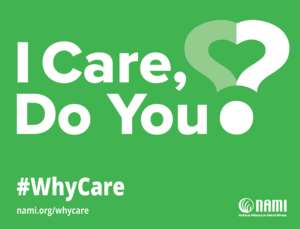
MENTAL ILLNESS AWARENESS WEEK IS OCTOBER 6-12
Each year, millions of Americans face the reality of living with a mental health condition. However, mental illness affects everyone directly or indirectly through family, friends or coworkers. Despite mental illnesses’ reach and prevalence, stigma and misunderstanding are also, unfortunately, widespread. That is why each year, during the first week of October, the National Institute on Mental Illness (NAMI) and participants across the country raise awareness of mental illness. Each year, they work to educate the public, fight stigma and provide support. We all experience emotional ups and downs from time to time caused by events in our lives. Mental health conditions go beyond these emotional reactions and become something longer lasting. They are medical conditions that cause changes in how we think and feel and in our mood. They are not the result of personal weakness, lack of character or poor upbringing. With proper treatment, people can realize their full potential, cope with the stresses of life, work productively and meaningfully contribute to the world. Without mental health we cannot be fully healthy.
Did you know?
1 in 5 U.S. adults experience mental illness each year
1 in 25 U.S. adults experience serious mental illness each year
1 in 6 U.S. youth aged 6-17 experience a mental health disorder each year
Suicide is the 2nd leading cause of death among people aged 10-34
The following links provide resources to help better understand and cope with mental illness:
FREE Adult Mental Health First Aid Training for ESD 112 Staff
As part of our awareness and prevention efforts, our ESD 112 Prevention Team will be offering Adult Mental Health First Aid training at no cost for ESD 112 staff on January 7, 2020 – Mental Health First Aid is a training program that teaches members of the public how to help a person developing a mental health problem, experiencing a worsening of an existing mental health or substance use problem or in a mental health crisis. Like traditional first aid, Mental Health First Aid does not teach people to treat or diagnose mental health or substance use conditions. Instead, the training teaches people how to offer initial support until appropriate professional help is received or until the crisis resolves. The training helps you identify, understand and respond to signs of addictions and mental illnesses. Topics covered include anxiety, depression, psychosis, and addictions.
SUICIDE PREVENTION AND AWARENESS
September was National Suicide Prevention Awareness month. And while we are a little late, we want to call attention to this very important topic that impacts families and communities all year long. The National Alliance on Mental Illness uses this as a time to share resources and stories in an effort to shed light on this highly taboo and stigmatized topic. It is also an opportunity for the alliance to reach out to those affected by suicide, raise awareness and connect individuals with suicidal ideation to treatment services. It is important to ensure that individuals, friends and families have access to the resources they need to discuss suicide prevention.
The following links provide additional resources.
FREE Online WA Suicide Prevention Training for Educators
The Office of the Superintendent of Public Instruction, in partnership with BASE Education and the National Center for School Engagement, has developed a training module to help educators recognize when a student is in emotional or behavioral distress including risk for suicide. The Confident Action and Referral by Educators (CARE) module is a free, one-hour resource that is available to anyone who works with students in Washington State. The module will help school staff to identify students who may be at risk and provides strategies on how to safely and effectively refer a student for help. CARE may be taken individually or in a group, and a Facilitator Guide is provided to guide staff through the specific examples, discussion questions, additional resources, and role play exercises.

Leave A Comment